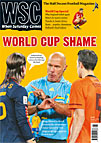 There was little sympathy for the losing finalists in South Africa. Derek Brookman laments an effective but aggressive approach
There was little sympathy for the losing finalists in South Africa. Derek Brookman laments an effective but aggressive approach
Holland’s first World Cup final for 32 years left a lasting impression, but unfortunately not for the right reasons. Johan Cruyff described his compatriots’ football as “ugly and vulgar”. In Spain, El País talked of “an unrecognisable Holland” and “intimidating behaviour”, while France’s Le Figaro said it “had all the characteristics of anti-football and was of unprecedented brutality”.
How did this happen? Where was the expansive, attacking football, dished up by technically-gifted players who could interchange positions at will? The transformation started two years ago when the Dutch FA appointed the pragmatic Bert van Marwijk as national coach. From day one, Van Marwijk let it be known to players and staff that it was his mission to bring the World Cup back from South Africa. His assistants Frank de Boer and Philip Cocu – members of the side that lost to Brazil in the 1998 semi-final – helped hammer home the message. Both former internationals believed there had been a lack of self-belief in the squad 12 years ago about going all the way, and that was something which shouldn’t be allowed to happen this time round.
Van Marwijk’s plan was essentially simple: protect a relatively dodgy defence with two combative, deep-lying midfielders, Mark van Bommel and Nigel de Jong, and rely on the flair players up front to create openings at the other end. Who can say he was wrong? His team had a 100 per cent record during qualification, won six games out of six on the way to the final, and came within the width of Iker Casillas’s shin from taking the lead against Spain and possibly becoming world champions.
However, there had already been rumblings in the Netherlands during the group phase about the dullness of the performances. This was an effective rather than effervescent side, ironically at a time when the German neighbours were serving up the most thrilling football of the tournament. But when Brazil were dispatched in the quarter-final many saw this as a new dawn for Dutch football. Individual brilliance and gallant underachievement had made way for a more collective approach that wasn’t always easy on the eye but had a higher chance of success. Then there was the hacking. The Dutch committed more fouls and picked up more yellow cards than anyone else in the tournament. They also chose the final to put on their dirtiest performance of all. With the world watching, much of the considerable credit built up over the years among neutrals evaporated, particularly due to Van Bommel and De Jong, neither of whom should have been on the pitch at the final whistle.
However, there are differences between the two. Mark van Bommel was widely regarded as his side’s best player in the first two group matches. Most Dutch were happy to have him back in the national side after Marco van Basten had petulantly marginalised him because of his apparent inability to follow instructions. People recognise and appreciate his footballing qualities, without approving of his constant fouling and intimidation. There is less sympathy for Nigel de Jong, already one of the most limited players in the team. His aggressive tackling should have seen him sent off during the first game against Denmark, and his attack on Xabi Alonso – plus his pitiful excuse that he “didn’t see the opponent coming in from the side and was just focused on the ball” – indicates a player with scant regard for the well-being of fellow professionals and who is also a liability for his own team. Few would mourn his absence, especially if he was replaced by someone (such as Rafael van der Vaart or Ibrahim Afellay) who also offers more creativity and attacking impulse.
There are many people here who agree with Cruyff that Van Marwijk’s men betrayed the country’s football heritage. “I’d much rather have lost 4-0 while really having a go than losing 1-0 and playing like that,” said one amateur football coach, while another thought that the scenario in Euro 2008 – annihilating France and Italy before tumbling out somewhat unexpectedly to Russia in the quarter-finals – was preferable to what had happened in South Africa. On the other hand, there were plenty of others who were full of admiration that their relatively small country had once again reached the World Cup final. An estimated 700,000 people turned out in Amsterdam to pay tribute to the squad after they returned, and both Van Marwijk and captain Giovanni van Bronckhorst received knighthoods. Finishing runners-up was obviously seen as a remarkable achievement, regardless of how it came about. Surely the next step is working out how to get the results while eliminating the thuggery.
From WSC 282 August 2010